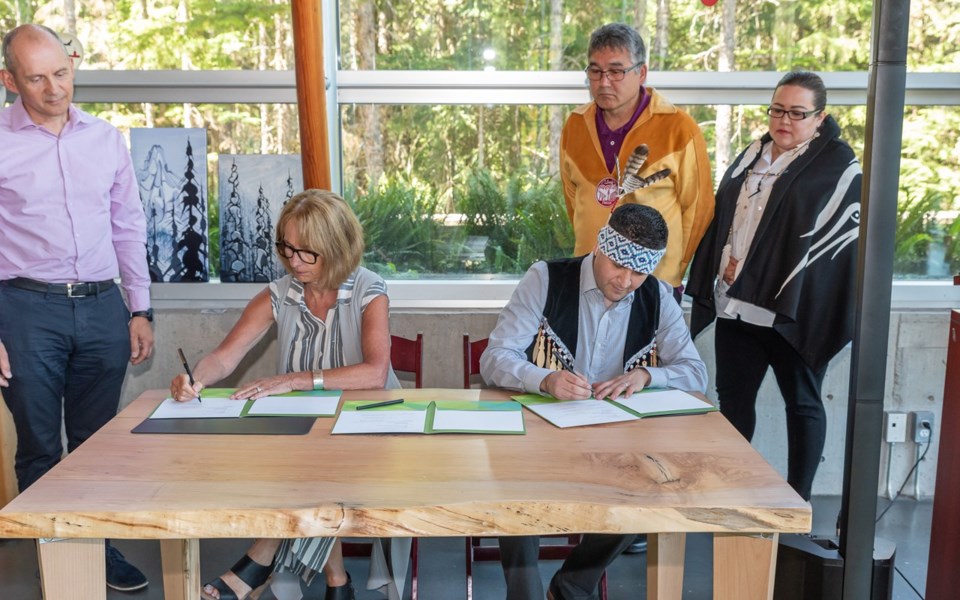The Squamish Nation, Lil'wat Nation and the Resort Municipality of Whistler (RMOW) signed a historic Protocol Agreement on Monday, July 16, formalizing a "cooperative relationship in the spirit of reconciliation."
"It's been a long time coming," said Deanna Lewis, official spokesperson for the Squamish Nation Council, of the five-page agreement, signed during an intimate ceremony held at the Squamish Lil'wat Cultural Centre. "It's like one big family. We feel like we're all on equal ground and moving in a positive direction forward."
The Protocol has "been something we've been working on for a number of years," added Whistler Mayor Nancy Wilhelm-Morden.
"It really provides a framework for the establishment of stronger government-to-government relations," she explained.
Relations hit a low point in 2012 when the B.C. Supreme Court quashed Whistler's planned update to its Official Community Plan (OCP) after the provincial government was found to not have adequately consulted with local First Nations throughout the process.
The RMOW is hoping to have a new updated OCP in place this year, one that now includes a chapter on "Reconciliation with Lil'wat Nation and Squamish Nation." This commits to creating "an enduring relationship" with the Nations, to establishing collaborative processes for Crown-land planning, and to enable the Nations' participation in Whistler's economy.
To that end, the RMOW, Squamish and Lil'wat have agreed to a land swap that would see the Nations receive a parcel of municipal land in Kadenwood in exchange for a parcel in Emerald West. The OCP supports up to 332 bed units for First Nations' development of market housing in one of Whistler's priciest neighbourhoods.
A central element of the Protocol is the establishment of a working committee, to be made up of political representatives and staff members from each of the three governments. The committee will be responsible for working together to foster the intent of the Protocol and address topics of common interest.
"Land development, roads, transportation; the list goes on," said Lewis of issues the committee will be looking to address.
"It's just doing better business. It would be better that we're all in the same room when we're discussing a lot of these developments. I don't feel like anyone (should) be left out.
"You know, there were times when our people always felt like we weren't invited to that table ... To able to have this reception and have that dialogue, we feel like we're all on equal ground. And that to me honours reconciliation."
The working committee will figure out which specific issues members will look to tackle and how frequently it should meet during its first gathering, Wilhelm-Morden explained.
"We do have some key areas of interest to both governments," she said, citing inter-governmental coordination, economic development and transportation initiatives as a few examples.
The terms of the agreement shape how the three governments "can come together to share information, improve communications and address issues of mutual interest," said, Lil'wat Nation's Political Chief Dean Nelson (Kúkwpi7 Skalúlmecw) in a release following the signing. "This agreement can be seen as an act of reconciliation, marking the beginning of a new relationship with Whistler and strengthening our existing relationship with Squamish Nation."
(Representatives from the Lil'wat Nation did not respond to requests for additional comment prior to Pique's deadline.)
The Protocol Agreement follows a prior agreement signed between the Lil'wat and Squamish Nations in 2001, formalizing the two nations' relationship and recognizing their mutual interests in land stewardship.
"It strengthened (the existing relationship) because we had both been good neighbours, and this kind of finalized it and made it not just a partnership, but feel like more of a family together," Lewis said. "I know (the RMOW has) seen the growth between our two nations, from our agreement from before ... They have learned and seen that this agreement does work. It's proof that we can move and work together."
The two nations also struck a partnership with Whistler Blackcomb as part of the company's 60-year Master Development Agreement (MDA), which was approved by the B.C. government and subsequently signed in 2017. That agreement was accompanied by a Memorandum of Understanding (MOU) between the RMOW, the Squamish and Lil'wat First Nations, Whistler Blackcomb and the provincial government outlining a commitment to collaboration, that was also signed in 2017.




